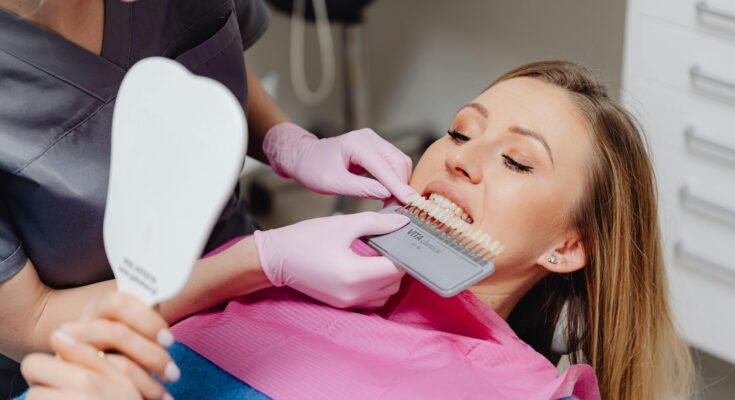hygiene is everything from a reason for a fresh smile to being sought for overall health. Our mouths serve as the entrance to the entire body, and it is through the mouth that a myriad of issues arise leading back to poor oral care-elevated cavities, gum disease, infections weight system, architectural, and cardiac issues. If one is trying to stave off dental problems or are already dealing in current or stepped-up programs of care, following tips could take you through ways to maintain excellent oral hygiene.
What is Oral Hygiene ?
Oral hygiene is thus an endeavor to keep the mouths clean, healthy, and disallowed from disease-biting for reasons of dental health, which would otherwise manifest in tooth decay(cavities), gum disease(g. aberration of tooth support structure including gingivitis and periodontitis), or bad breath(halitosis). Thus, oral health care is brushing wishing and flossing teeth regularly and meeting routine dental visits.
1 . Importance of Oral Hygiene :
the major factors on which oral hygiene depends are
Prevention of Tooth Decay and Cavities: One may need to brush and floss regularly to never let their teeth get decayed, i.e. outside it.
Prevention of Gum Disease: Disease identified with gums, which has swollen and is bleeding while making an individual lose their gum and thus making them more prone to diabetes and heart diseases.
Prevention of Bad Breath: Bad breath may be due to poor oral hygiene; food particles and bacteria prevent an individual from having a breath pleasant to them.
Increasing General Well-being: Some recent investigations have shown a direct link involving oral health and general well-being in humans. Because of the ill effects of oral health, heart problems, respiratory problems, and complications with diabetes have been found.
2. How to Maintain Good Oral Hygiene :
Good oral hygiene can be understood as the attainment of the following:
A) Brush Your Teeth Twice Daily:
Brushing Techniques:
Choose fluoride toothpaste, as it fights decay and also strengthens dentin and enamel.
Brush for two minutes for complete cleaning on the outer, inner, and chewing surfaces of the teeth.
Hold the brush at a 45-degree angle toward the gumline.
Never forget to brush your tongue, either.
B) Floss
Flossing is important for the removal of plaque and food particles between your teeth. Here’s a how-to-
Use approximately 18 inches of floss and wind it around your fingers.
Now push the floss gently between your teeth and twirl your hand around. The floss will pull toward the tooth and then slide down the gum line.
C) Mouthwash
In a nutshell, mouthwash is a great companion for oral hygiene.
It eliminates bacteria and plaque.
It is good to use because it can reach to areas where a brush cannot reach and floss cannot clean.
Very often, it is also responsible for freshening up your breath.
A proper mouthwash containing fluoride and bactericidal elements is indeed beneficial in many aspects.
3. The Healthy Diet for Sound Teeth :
A healthy mouth is vital for your physiology. Hence, good nutrition and vitamins and minerals intake keep your teeth and gums strong. Here is what you should eat and keep off:
Include:
Calcium-Rich Foods – Milk, Cheese, or Yogurt are essential for maintaining strong and healthy teeth.
Crunchy Fruits and Vegetables – Apples, carrots, and celery may serve as natural toothbrush formation. They defend against plaque-building bacteria.
Drink water: Drink water to keep your mouth moist and helps in flushing food debris and bacteria from the mouth.
FoodFoods to Avoid:
Sugary Snacks and Drinks: Sugars nurture contagious bacteria that induce cavities.
Acid Foods: Acidic foodstuffs-such as citrous and soda-may act in an erosion of the enamel.
Sticky Foods: All sticky foodstuffs-caramel, dried fruits, crackers, etc.-predispose someone to heighten their susceptibility to ’decaying’.
4. Importance of Regular Visits to the Dentist :
In addition to those very successful home treatments of which I have spoken about, regular visits to the dentist by the patients are strongly recommendable. Since patients should have these visits every six months, a few points can be mentioned :
1.Provided professional cleaning by the dentist eliminates tartar(bacteria-laden hardened plaque); 2. Examination of the mouth to check for decay,gum diseases and any other oral problems; 3. Individual oral care program.
Regular checkups and cleaning should be conducted, and these processes should, in principle, occur every six months.
5. Common Oral Hygiene Mistakes to Avoid :
A well-known oral hygiene blunder would be brushing too hard, i.e., being aggressive with a toothbrush, which may be injurious to the gums and would wreak havoc on the enamel in due course; wrong brushing technique-the toothbrush with a stiff bristle would injure even your tender gums; failing to brush at night; allowing food scraps to run riot on cavity-food producers during the night; replacing the toothbrush is also commonly neglected before it is time-a recommendation is that it undergo replacement every three months or when bristles wear out.
6. Oral Hygiene for Kids :
Oral hygiene should be one of these things to be prevailed upon at a very tender age for their health in future. Following are a few strategies attacking some of the initiatives you can take:
Early Start: Clean your baby’s gums with a wet, soft cloth before his/her teeth have erupted. Once his/her teeth are in, replace that soft cloth with a soft-bristled toothbrush.
Make Brushing Fun: Let your kids choose their brush and toothpaste and make it interesting with different cartoons and colors.
Supervise Brushing: Ensure that kids brush their teeth correctly for two full minutes.
Visit Dentist Early: The American Dental Association recommends a child visit the dentist by their first birthday.
7. Special Considerations to Make During Oral Hygiene :
Some people may need extra oral care based on their circumstances.
A) Oral hygiene during pregnancy
Pregnancy can lead to hormonal changes that increase the odds of gum diseases. It’s very important to:
Continue your usual routine of brushing and flossing.
Rinse your mouth with water or mouthwash, just in case the morning sickness makes you vomit.
Inform your doctor about being pregnant; certain procedures might need to be rescheduled after you deliver.
B) Oral hygiene in the elderly
With age, oral health can sometimes become a hurdle. Sometimes dryness of the mouth, receding gums, and certain conditions like arthritis may make brushing difficult. Here are some tips for professing healthy habits.
Drink a lot of water for dry mouth.
Use an electric toothbrush for easy brushing.
Visit a dentist for a regular check-up and for advice on dealing with oral problems encountered with age .
Conclusion :
The Importance of Oral Hygiene for Health
Oral hygiene is pivotal to support other health facets because it works against other dental diseases, such as caries, gum diseases, and bad breath. For safe teeth and gums, a person must be on a regimen of oral care: everyday brushing and flossing, mouthwash use, and periodic visits to the dentist. Maintenance of your teeth, maintenance of a bright smile, and prevention of the detrimental effects of poor oral hygiene require good oral, habits, a balanced diet, and information from professional dental practices for sound dental health. Attending to one’s mouth goes beyond simply looking nice, for it is an investment in health for the near future.

